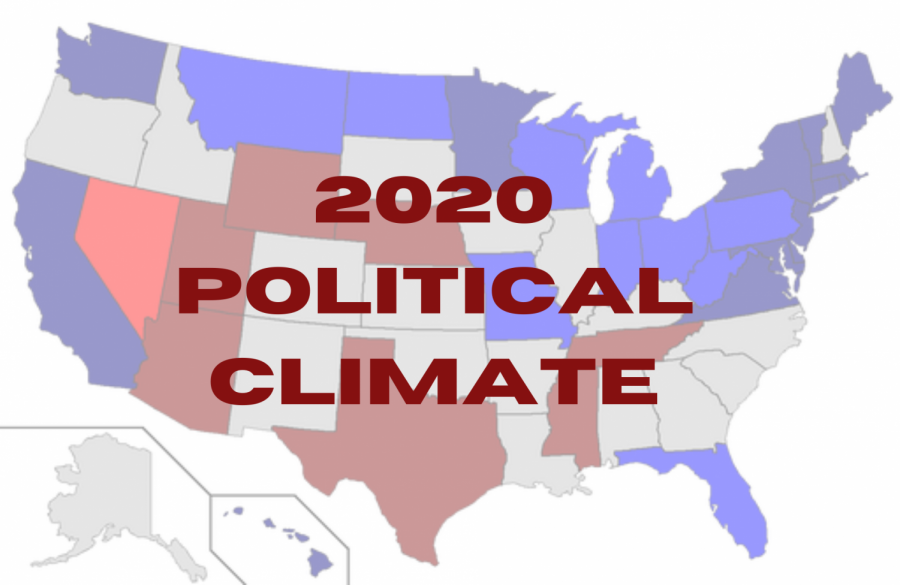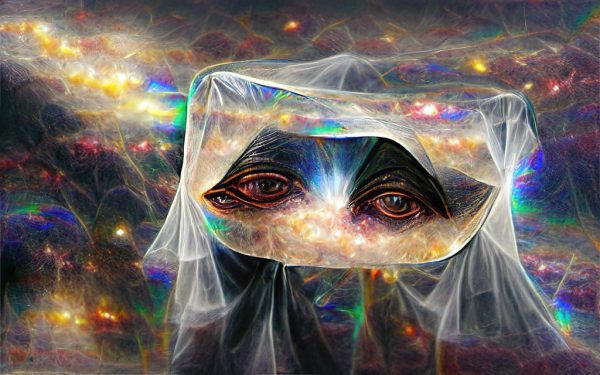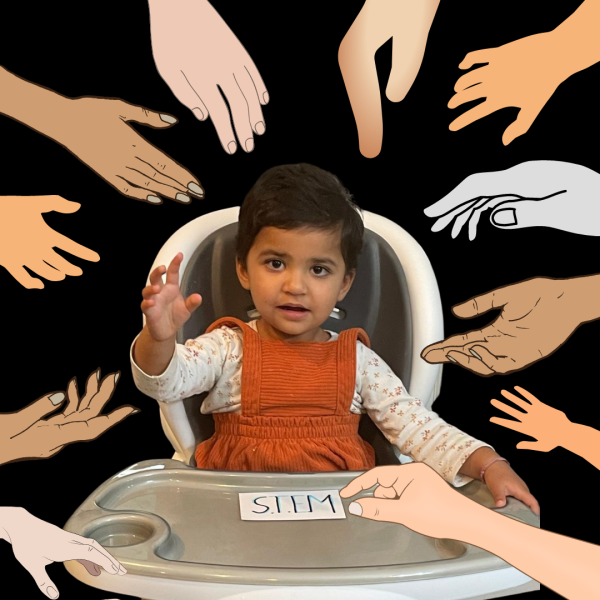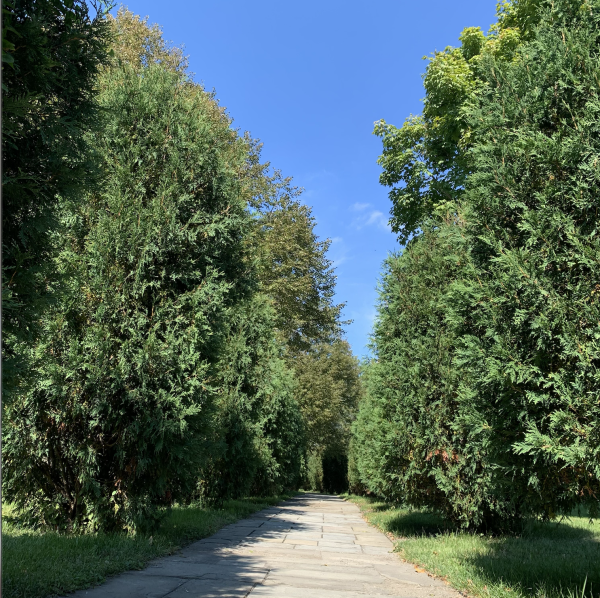Destigmatizing Politics: Why we won’t speak up
Image used via Wikimedia Commons under Creative Commons license. Edited by Naisha Roy
Divided we fall. The nation is probably seeing the greatest political divide yet going into the 2020 election. This is making teens more scared than ever to make their voice heard.
Disclaimer: The opinions expressed in this piece belong solely to their respective author(s). They do not necessarily represent the opinions of South Forsyth High School or Forsyth County Schools.
I’m a 16-year-old immigrant girl without citizenship and no way of voting anytime soon; yet with the elections drawing closer, I’m terrified to discuss my political views in public. Almost every discussion recently circles around to the elephant (or donkey) in the room, and I find myself clocking out almost every single time. I’m not the only person with this apprehension; a survey by the BioMed Central revealed that out of 80 teens, a majority experienced physical or emotional distress before and after the 2016 presidential election. Teenagers, the majority of whom can’t even vote yet, are still extremely stressed out due to elections and the state of the nation. With the pandemic and social issues spiraling around the world, political tensions have been higher than ever. As these very teens, we need to discuss the stigma of politics, because we can’t change the future of our nation if we’re scared of it.
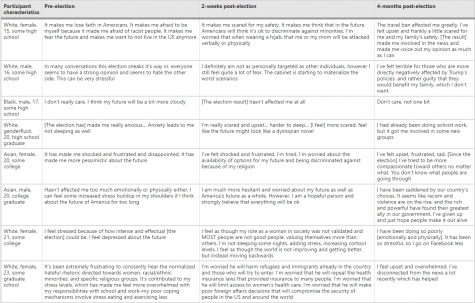
The Political Climate
It’s no secret that Forsyth County, as a whole, leans right in politics. In the 2016 election, 70.6% of Forsyth County citizens voted Republican. This overwhelming majority leads the way to a lot of group polarization and extremist thoughts; conversely, it also leads to Democrats feeling like they can’t speak up. No matter where you lean in politics, it feels like voicing political opinions is only going to lead to criticism. If you lean right, you get called outdated; if you lean left, you get called a snowflake; and if you’re a centrist then you may as well just throw your vote away. In a study by the Pew research center, “75% of Democrats say Republicans are “more closed-minded” than other Americans… A 63% majority of Republicans say that, compared with other Americans, Democrats are “more unpatriotic.”
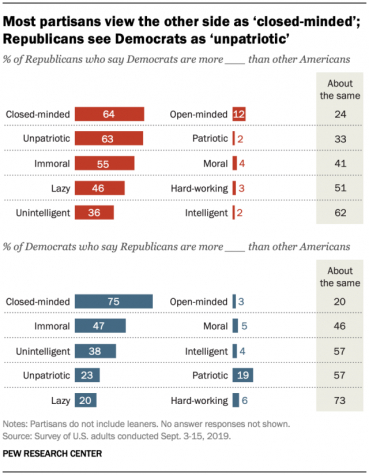
Yet at the same time, these very people also agree that the partisan divide is too large. We’re creating the very problem we’re scared of! We think that the two parties are too divided, yet we build all these preconceived notions about the other party that we can’t even bring ourselves to start mending those bridges. Our own President, regardless of my support level for him, is guilty of this; every tweet seems to have something against the “left” and how they’re so horrible. Regardless of the truth of this, he’s still blaming large sections of the people he leads. It’s easy to blame the other side as a way of rallying people for your party, but ostracizing anyone with the opposite views encourages supporters to do the same.
I’ve been guilty of this myself; when I see someone waving the banner of the opposing party, I get scared. I start judging them, thinking there’s no way I could ever find myself agreeing with them. And all of this is because of the political climate we live in currently. It’s because it’s a lot easier to see people as just a political affiliation that’s incorrect than it is to see them as real people. But this is just contributing to the toxic environment more than ever. I used to think hostility towards the other side was justified; when someone displayed racist behavior towards me and was waving a banner with the opposite party, I linked the two together inextricably. But you wouldn’t start hating the color red just because someone who was mean to you was wearing it; same goes for political beliefs. And seeing people as more than their political affiliations does make a difference.
A few people in one of my classes discuss politics on the daily and have views very different from mine. After a few days of sitting in silence in that class, I finally chimed in and brought in my point of view, and they were perfectly agreeable about it. I breathed a sigh of relief because I had almost expected them to hate me; I didn’t realize that they were just as open to the other side. And while my belief system still doesn’t align with theirs, I could finally see where they were coming from. It was a revelation to learn that they were also scared of voicing their beliefs because they didn’t want people to label them as racists, or sexists, or any other stereotype associated with it. I didn’t want to say my beliefs out loud because I didn’t want to be labeled a stereotype, either. No matter what political side, people are scared of speaking out, and it’s a problem.
The importance of reaching across the aisle
Bridging this gap between different political views is extremely important, perhaps more so to me, a non-voter, than anyone else. We need to have discussions with people who don’t agree with us–civil, justified discussions. According to the New York Times, “Put a diverse group of people in a room… and they’re likely to mute their harshest views and wrestle more deeply with rebuttals… They become more informed, even more empathetic.”
People are more likely to be rational and intelligent with people they don’t agree with than those they do because they don’t have the tribal mentality to gas them up. And I rely on this. As a minor and an immigrant, the voters of this nation decide my entire future and I don’t get a say in this. So, it’s terrifying seeing people silently grow farther and farther apart because they’re scared of being judged. If the whole nation made a decision that wasn’t in my favor completely, I would understand because at least it was agreed, researched, discussed, and then decided. But recently, more and more people aren’t agreeing with their political parties because they support its beliefs; they’re agreeing because they don’t like the other party. This is scary because if people are voting primarily based on what they don’t agree with, this opens up the doorway to more and more hostility; and as a minority, I’m scared that hostility will be targeted towards people like me. Political disagreements have ruined relationships, caused people to lose their jobs, and even caused anxiety issues in many people. Call me selfish, but this needs to stop.
How can we find common ground?
There are so many ways to clear the political air. We have to start by remembering that our opposition are human beings, and their political beliefs shouldn’t negate that. I remember having a wonderful meal with one of my friends’ parents, but when I got to their house, they had banners from the opposing party strung everywhere. I started thinking, that’s so weird, I thought they were really nice. Immediately I had to check myself; just because someone believes in one party, doesn’t mean they lose all personality positives. We have to learn to practice empathy and use phrases that question ideas, not people. The difference between “You’re a bad person!” and “That’s a bad idea!” can ruin a friendship, and it’s causing an alarming amount of future voters to sit in silence.
At the end of the day, there will always be political extremists and people that only seek to harm the other side. But normal citizens need to expose themselves to the other party and make an informed decision; it comes with the civil responsibility of voting. Without this, more and more people are going to be scared of speaking up. I want to be able to go to school and discuss who I support without threat. I want people from the other side to be able to discuss who they support without being called names. The stigma around politics is getting too big, and we have to remember that regardless of red or blue, they still make up the colors of the American flag as a whole.


